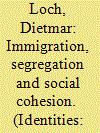| Srl | Item |
| 1 |
ID:
112101


|
|
|
|
|
| Publication |
2012.
|
| Summary/Abstract |
This article examines the linkages between urban governance structures and an economically successful and environmentally sustainable democratic city. It will consider both developed and developing cities and the policy challenges that confront them in the twenty-first century. It is important to understand the political causes of urban economic decline, the unique fiscal and legal constraints on city governments and the opportunities for democratic participation and sustainable economic growth that only cities can offer. Urban policies or programs are only successful if they harmonize with city politics and with a city government's fiscal and operational capacity for implementation. The objective of this article is not simply to present the challenges of governing the twenty-first century city, but also to describe the structural characteristics of cities that promote democratic participation, effective urban governance and policies that support public safety, economic growth and environmental sustainability.
|
|
|
|
|
|
|
|
|
|
|
|
|
|
|
|
| 2 |
ID:
134335


|
|
|
|
|
| Summary/Abstract |
In this article, we analyse immigrant integration against the background of German society’s social cohesion. First, we examine the integration process and policies with regard to the integration of first-generation labour migrants into the German ‘national society’ since the 1960s. Even though these ‘guest workers’ were confronted to ethnic and political exclusion owing to the so-called German integration model, they experienced socio-economic integration and, at the local level, some form of political participation. Secondly, we analyse the policies and the integration process of immigrant youth, specifically those of Turkish descent, into contemporary German society, the social cohesion of which is impeded by social exclusion and urban segregation. Our hypothesis is that – in spite of a long-standing refusal to recognise itself as an immigration country – Germany has to some extent incorporated its migrants and achieved an integration consensus, while paradoxically, national integration models in several other Western European countries are currently going through a deep crisis.
|
|
|
|
|
|
|
|
|
|
|
|
|
|
|
|